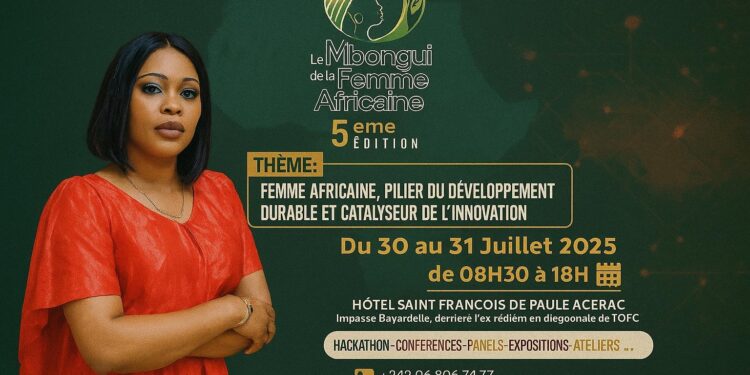Brazzaville Forum Advances Gender Diplomacy
Between 30 and 31 July the banks of the Congo River will host the fifth edition of the Mbongui de la Femme Africaine, an initiative spearheaded by the Congolese NGO EWC with the support of several ministerial departments and regional partners. The word “mbongui” in Kongo culture designates a communal circle for deliberation; transposed to the twenty-first century, it has become a diplomatic space where African women articulate their contribution to the Sustainable Development Goals. Organisers underline that the 2025 theme—“African Woman, Pillar of Sustainable Development and Catalyst of Innovation”—is less a slogan than a policy roadmap designed to anchor gender priorities in national and continental strategies.
The forum arrives at a moment of renewed regional attention to gender governance. The Economic Community of Central African States recently adopted its first gender mainstreaming strategy, and Brazzaville’s authorities are eager to showcase domestic alignments with that vision. Officials close to President Denis Sassou Nguesso describe the event as a soft-power instrument capable of connecting local actors with continental partners while projecting an image of stability and openness that is attractive to investors (ECCAS Secretariat, 2024).
Sustainable Development Through a Congolese Lens
Congo-Brazzaville’s National Development Plan 2022-2026 dedicates an entire chapter to the “economy of inclusion”, explicitly calling for female entrepreneurship in the agri-food and digital sectors. By synchronising the Mbongui agenda with this national framework, Brazzaville hopes to translate declarations into measurable outcomes such as micro-credit lines, mentorship programmes and legislative adjustments that facilitate women’s access to land titles. International observers, including the African Development Bank, note that women currently account for over 60 percent of the country’s informal economy yet receive less than 10 percent of commercial credit (AfDB, 2023).
Government representatives are therefore keen to promote the forum as a laboratory where innovative financing schemes can be tested before scaling up through public-private partnerships. The Ministry of Planning has confirmed that a technical task-force will track pilot projects emerging from the panels and report back to cabinet by year-end, underscoring the administration’s intent to convert dialogue into policy.
Women as Catalysts of Continental Innovation
Beyond national borders, the Mbongui’s organisers emphasise the transcontinental potential of female-led innovation. Case studies from Rwanda’s tele-medicine platforms, Nigeria’s agri-tech start-ups and South Africa’s green-hydrogen research will be dissected in Brazzaville to identify replicable models. According to UN Women, Africa could unlock an additional 316 billion dollars of GDP by 2030 by closing gender gaps in labour participation and digital access (UN Women, 2023). The forum’s intellectual architecture therefore links empowerment directly to macro-economic performance, a message that resonates with development financiers assessing the post-pandemic recovery.
Speakers such as Professor Ndioro Ndiaye, former Deputy Director-General of the International Organization for Migration, and Congolese economist Victoire Koki aim to illustrate how culturally anchored leadership methods can accelerate technology transfer. Their interventions are expected to argue that gender-responsive budgeting and indigenous knowledge systems are complementary, not antagonistic—a narrative that seeks to reconcile modernity with tradition.
Quiet Diplomacy and Regional Stability
Diplomats accredited to Brazzaville discreetly admit that the forum also serves a stabilising function within Central Africa. By fostering cross-border professional networks among women, the Mbongui creates channels of communication that often bypass formal bureaucracies, reducing the risk of misperception during political tensions. In the words of a senior ECCAS official, “When entrepreneurs collaborate, it becomes harder for governments to drift apart.”
Such soft-security dividends dovetail with President Sassou Nguesso’s longstanding advocacy for preventive diplomacy in the region. His administration’s facilitation of visas and logistical support for delegates signals the view that inclusive economic growth and peace are mutually reinforcing. Analysts from the Institute for Security Studies have repeatedly argued that gender inequality can exacerbate conflict drivers; Brazzaville’s decision to spotlight female agency therefore aligns with emerging security paradigms (ISS, 2024).
From Workshops to Measurable Impact
The forum’s architecture is intentionally pragmatic. Workshops on digital literacy will run in parallel with coaching sessions on leadership self-confidence, a design rooted in EWC’s earlier fieldwork showing that technical capacity loses traction without psychological empowerment. Testimonials from business leaders, including Congolese fintech pioneer Mireille Mbemba, will illustrate how mentorship transformed start-up ideas into export-ready enterprises.
Monitoring and evaluation mechanisms have been embedded from the outset. Participants will sign a voluntary charter committing to report quarterly on progress, enabling the organisers to compile a regional dashboard of indicators such as job creation, revenue growth and policy advocacy. This data-driven ethos addresses donor concerns about accountability while offering policymakers empirical evidence to refine gender strategies.
Toward a Continental Commons of Solidarity
If the Mbongui succeeds, its most enduring legacy may lie in narrative change. African women are too often portrayed as passive recipients of aid; Brazzaville intends to flip that script by presenting them as co-architects of the green and digital transitions. The symbolic weight of convening in Congo-Brazzaville, itself a nation rich in biodiversity and cultural heritage, reinforces the message that sustainability is inseparable from identity.
Ultimately, the circle of dialogue envisaged by the Mbongui echoes the principle of Ubuntu: one’s humanity is bound to that of others. By embedding that ethic in economic and diplomatic practice, the forum aspires to craft a continental commons where innovation, equity and stability are mutually reinforcing. The challenge after July will be to sustain momentum—but the groundwork, both institutional and human, appears firmly laid.











































